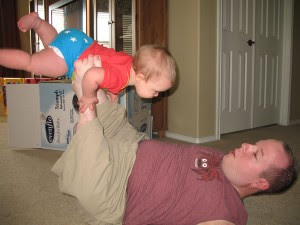
Here’s how to respond if your child asks an “embarrassing” question in public to a disabled person.
If your child has embarrassed you with questions to disabled people, or reactions to disabled people in public, a man who was born without arms has advice for how parents should deal with these tricky situations.
Chet McDoniel grew up without arms, and has very short legs. When he’s in public, people, including children, will stare, and sometimes there are questions, comments and reactions.
If your child has loudly called your attention to a person with a disability; or your curious kid has actually approached a handicapped person and inquired about the disability, McDoniel offers superb tips in how you, the parent, should respond.
The first and foremost rule for parents when their child blurts something about the nearby handicapped person is DO NOT SPANK.
McDoniel, father to two, explains that, though the parent should not ignore the child who spots an obvious disability, he also believes that parents should never “rebuke the child openly/loudly for their behavior.”
McDoniel continues: “I have even seen parents hit or spank their children for the outburst. I can only assume that the parent is embarrassed, and yes, outbursts like that need to be corrected.
“However, I believe that type of correction only serves the purpose of furthering the child’s fear of people who look different than they do.”
If your child spots a disability, consider this an opportunity to educate about the disability, rather than punish for being curious about handicaps.
There are general ways for parents to respond to kids who have noticed a disabled individual, and there are also specific ways parents can react, based on the child’s age and the specific behavior of the child. First here is McDoniel’s general guideline:
“If the parent has the opportunity, I recommend for them to stop what they are doing, get eye-to-eye with the child, and explain that some people look different, but that does not mean they aren’t people, too.
“Many times, with this reaction, I’m able to speak to both the parent and child, which reinforces what I am saying because mom or dad can interject when needed.
“Even better, when the parent involves me in the conversation, I get a golden opportunity to share God’s love with both the parent and the child. Even though I may look different, God still loves me in every way that He loves you.”
Specific situations involving kids who make comments about disabled people in public:
Child is preschool age and loudly blurts, “Look Mommy, that man…”
“Never stifle the child’s curiosity. Preschool children who have outbursts like this are truly surprised by what they see.
“They don’t mean it as an insult, but rather, that they are trying to reconcile what they are seeing with what they know about the world around them.
“Kneel down and talk about people who look different than we do. Unfortunately, many parents try to quiet the child, which will lead to more outbursts, rather than simply talking out the issue.”
Child is preschool age and can’t stop staring (though says nothing).
“Same kind of thing … while it’s important to talk to them about staring, a parent must let their child know that there is nothing to be afraid of.”
Child is grade school age and keeps staring, but says nothing.
“At this stage, I fear the parent has not followed the above advice and has allowed the child to treat others who look different as spectacles instead of allowing the child to know others as humans, first. It isn’t too late, though.
“Again, I would say that you cannot allow the child to continue to stare, but take the opportunity to have the child tell you their feelings about the person they saw.
“Then, work through those observations and feelings to help them understand why staring is inappropriate … and also why people who look different should be treated with kindness as they would treat anyone else.
Child is grade school age and actually goes up to person with disability and innocently asks about the handicap.
“I absolutely love this situation. It gives me a chance to tell the child about myself and to break down the communication barrier. Never apologize for the child’s curiosity.
“This is a perfect teaching opportunity, and it will allow the child to get to know the handicapped person.
“You might approach the person before the child does in order to ask if it’s okay for the child to ask a question.
“While I have never met a person with special needs who would be rude in this situation, I can imagine that such a person does exist, and you do not want the child to have a negative encounter at this stage.”
A parent’s instinct, when a child goes over to a disabled person and asks, “What happened to your arms,” or, “Why can’t you walk?” is to grab the kid by the arm or shoulder, mutter something like “Johnny! How can you?!” and then pull the kid away from the handicapped individual.
Now think about this for a moment. What message did you just send to an impressionable youngster?
You just made it far more difficult for him to ever feel comfortable or at ease around someone who’s handicapped, and your reaction won’t motivate him to befriend any disabled kids at school; he’ll feel it’s “wrong” to go over to them.
Child is grade school age and behaves fearfully or uneasily.
“Never ignore this issue. I have had grade school children who have been terrified of me because of the way the parent has either ignored or punished these behaviors.
“It’s ridiculous for a child to be afraid of a person with special needs, but the behavior can always be traced back to the parent and how they handled the child’s interactions with handicapped people.
“Take the time to reassure the child in that moment, and spend some time back at home working on building confidence.”
Grade school or junior high age kids are snickering amongst each other, pointing, whispering, giggling.
“At this age, if they are doing these kinds of things, I fear that parents have failed.
“Unfortunately, about the only thing you can teach at this point is to correct the behavior.
“Hopefully, once they mature, they will value all kinds of people enough not to do these kinds of things. That’s why it’s important to teach early.”
Child is junior high or teenager, and reacts in an alarming way with, “Oh my God, Mother, oh God, that man has no arms…(or whatever the situation)…” The adolescent or teen may let out an expletive and appear very distraught and upset.
“A parent cannot allow this kind of behavior. At this age, they know what is appropriate in a public setting, and if they won’t value the handicapped person enough not to make this outburst, at least teach them to control their reaction.
“Again, since the child wasn’t taught to respect early on, I fear you’ll just have to wait until maturity hits for this type of behavior to stop.”
Read more about inspirational speaker Chet McDoniel, author of “I’m Not Broken: You Don’t Need Arms to Be Happy.”
Visit Chet’s site at: chetmcdoniel.com









































